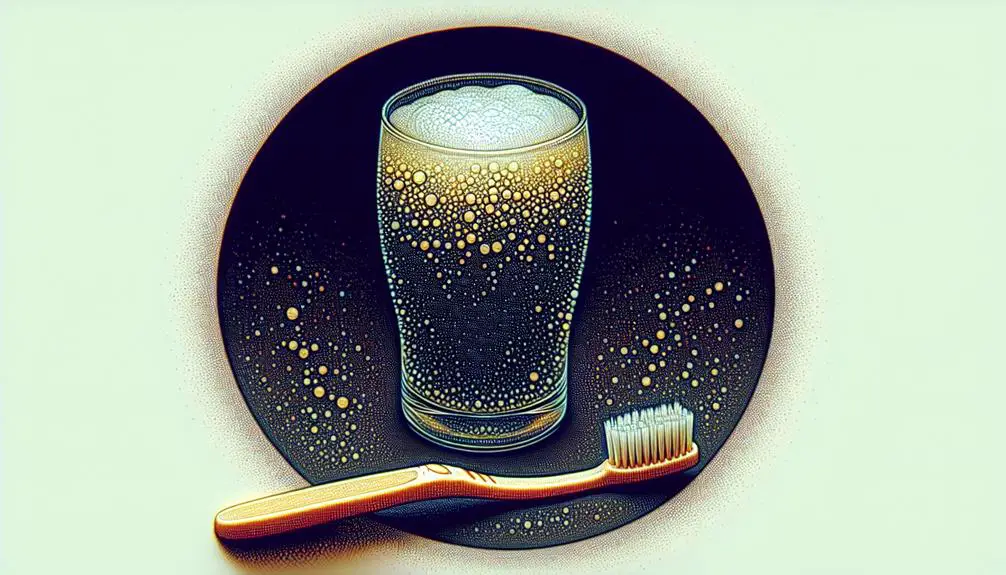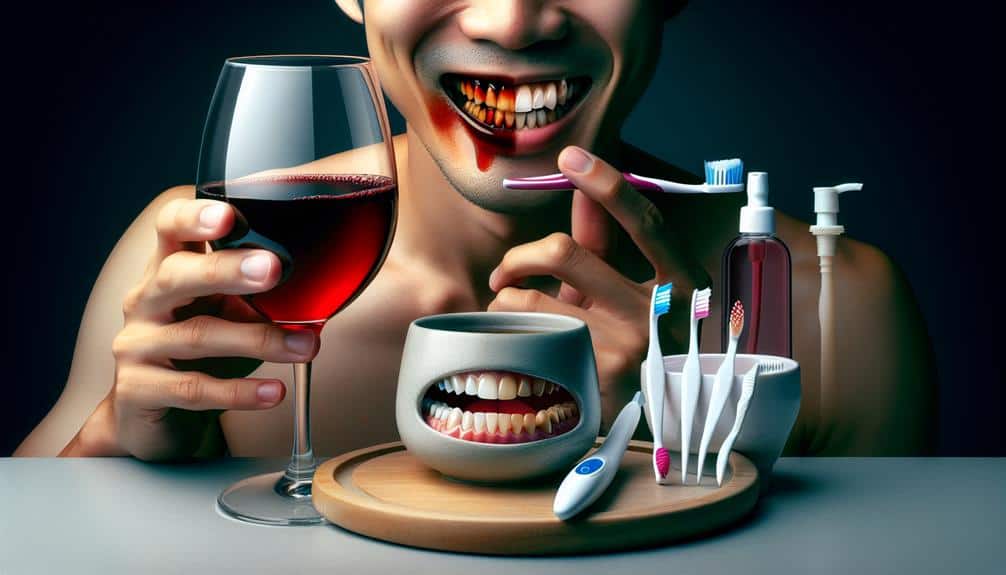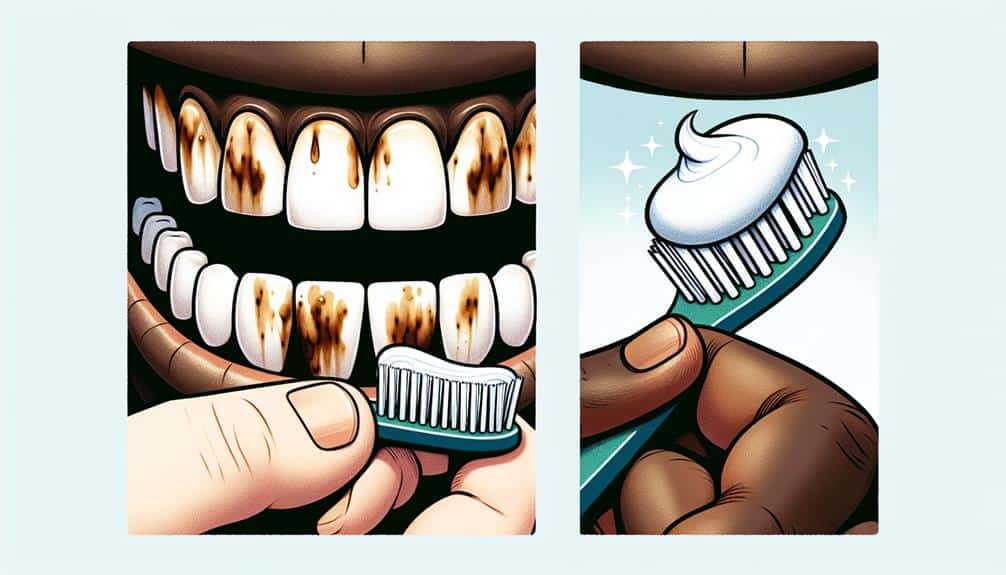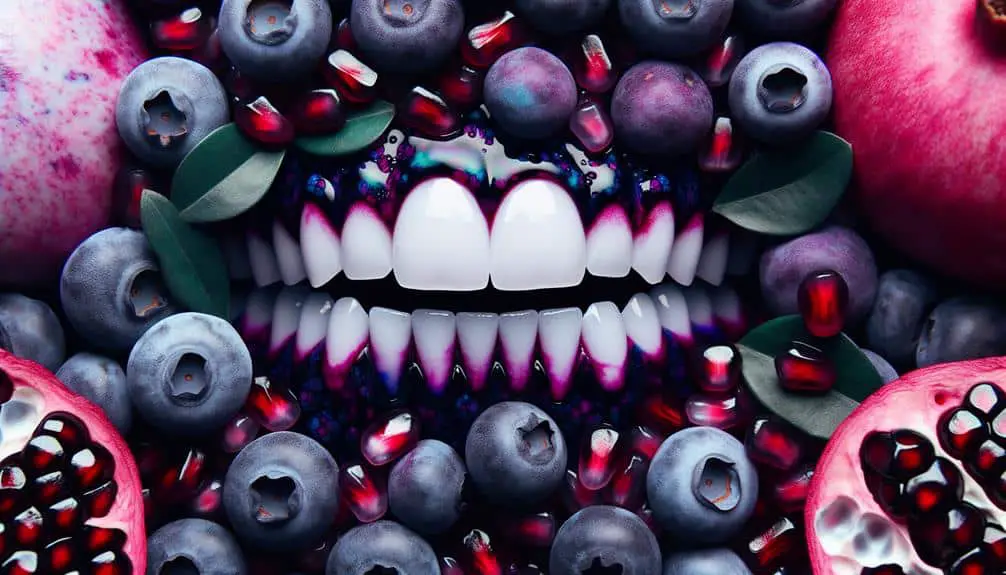When you drink carbonated beverages, the high acidity levels gradually wear down your tooth enamel, causing discoloration and potential dental problems. Enamel erosion weakens your teeth, making them more susceptible to stains and sensitivity. To maintain your oral health, limiting your intake of acidic carbonated drinks is essential. Remember, protecting your enamel is vital for preserving your teeth's natural color and overall health.
Key Points
- Carbonated drinks erode enamel, leading to discoloration.
- Acids in these drinks weaken tooth structure, causing stains.
- Regular consumption exposes teeth to staining agents in drinks.
- Enamel erosion from carbonated drinks impacts tooth color.
- Implementing enamel protection can help prevent discoloration.
Acidic Nature of Carbonated Drinks
The acidic nature of carbonated drinks can erode tooth enamel over time, leading to teeth discoloration and potential dental issues. Carbonated beverages often have low pH levels, indicating their acidic properties. When these drinks come into contact with the teeth, the acids can gradually wear down the enamel, which is the protective outer layer of the teeth. Enamel erosion weakens the teeth, making them more susceptible to discoloration and other dental problems.
To understand how enamel erosion occurs, it's important to take into account the pH levels of carbonated drinks. Beverages with a pH below 5.5 are considered acidic and can harm the enamel. The acids in these drinks can demineralize the enamel, making it more prone to erosion. As enamel erodes, it exposes the underlying dentin, which can lead to increased tooth sensitivity and aesthetic issues like discoloration. Limiting the consumption of highly acidic carbonated drinks is essential in order to protect the enamel and maintain good oral health.
Erosion of Tooth Enamel
Constant exposure to acidic carbonated drinks can gradually wear away the vital enamel of your teeth, leading to erosion and potential dental complications. Enamel is the hard outer layer that shields your teeth from damage, and once it erodes, it can't regenerate. This erosion weakens the teeth, making them more susceptible to issues such as tooth sensitivity.
Tooth sensitivity occurs when the underlying dentin, a softer tissue than enamel, is exposed due to enamel loss. This can lead to discomfort or pain when consuming hot, cold, or sweet foods and drinks. To protect your enamel, it's imperative to limit the consumption of carbonated drinks and maintain good oral hygiene practices.
Using a straw when drinking carbonated beverages can help reduce direct contact with your teeth, minimizing the risk of enamel erosion. Regular dental check-ups are also essential to monitor any signs of enamel erosion and address them promptly to prevent further damage and maintain enamel protection.
Formation of Dental Plaque
Gradually accumulating on tooth surfaces, plaque poses a significant threat to oral health, emphasizing the importance of regular cleaning and preventive measures. Plaque is a biofilm mainly composed of bacterial accumulation that forms on teeth when food particles mix with saliva. These bacteria thrive on sugars and starches from the food you eat, producing acids that attack tooth enamel, leading to decay and discoloration. Proper oral hygiene practices, such as brushing at least twice a day and flossing daily, are vital in preventing plaque buildup.
When plaque isn't adequately removed, it can harden into tartar, a substance that can only be removed by a dental professional. Tartar not only contributes to teeth discoloration but also serves as a breeding ground for more harmful bacteria, exacerbating oral health issues. Regular dental cleanings are essential to remove tartar and maintain oral health. Understanding the relationship between bacterial accumulation in plaque and oral hygiene practices is fundamental in preventing teeth discoloration and maintaining a healthy smile.
Interaction With Tooth Stains
Interacting with various substances, carbonated drinks can contribute to tooth stains and discoloration over time. When these drinks come into contact with your teeth, they can lead to the development of unsightly stains.
Here are some key points to keep in mind in managing tooth stains caused by carbonated drinks:
- Stain Prevention Techniques: Implement good oral hygiene practices such as regular brushing and flossing to prevent the buildup of stains on your teeth.
- Limit Consumption: Reduce the frequency and quantity of carbonated drink intake to minimize the exposure of your teeth to staining agents.
- Use a Straw: When drinking carbonated beverages, contemplate using a straw to bypass direct contact with your teeth.
- Professional Whitening Treatments: Consult with a dental professional for effective whitening treatments to address existing tooth discoloration.
Impact on Tooth Coloration
When carbonated drinks come into contact with your teeth, they can significantly impact the coloration of your enamel over time. The acids present in these beverages can erode the enamel, which is the outermost layer of the tooth. Enamel is vital for protecting your teeth from decay and maintaining their whiteness. As the enamel wears down due to the acidic nature of carbonated drinks, the underlying dentin, which is yellowish in color, becomes more visible. This can lead to a yellow or discolored appearance of the teeth.
To counteract the impact of carbonated drinks on tooth coloration, focusing on enamel protection and tooth whitening is crucial. Using toothpaste and mouthwash that promote enamel strengthening and remineralization can help protect your teeth from discoloration. Additionally, seeking professional dental treatments like whitening procedures can assist in restoring the natural whiteness of your teeth. By prioritizing enamel protection and tooth whitening practices, you can mitigate the effects of carbonated drinks on tooth coloration and maintain a bright smile.
Frequently Asked Questions
Can Using a Straw When Drinking Carbonated Beverages Help Reduce Teeth Discoloration?
When sipping carbonated drinks through a straw, you limit direct contact with teeth, potentially reducing discoloration. However, colored straws may stain teeth. Overall, using a clear straw can offer benefits in preventing teeth discoloration from carbonated beverages.
Are Sugar-Free Carbonated Drinks Less Harmful to Tooth Enamel Compared to Sugary Ones?
Opting for sugar-free carbonated drinks may be better for your teeth due to reduced risk of enamel erosion. Artificial sweeteners can help minimize dental implications linked to high sugar content. Consider pH levels for overall dental health.
How Does Drinking Carbonated Water Compare to Drinking Other Carbonated Beverages in Terms of Teeth Discoloration?
When comparing drinking carbonated water to other fizzy drinks for teeth discoloration, consider pH levels affecting enamel damage and mineral content leading to staining effects. Be mindful of these factors for a healthier smile.
Do Carbonated Drinks Have a More Significant Impact on Tooth Coloration in Individuals With Certain Dental Conditions?
If you have certain dental conditions or genetic predispositions, carbonated drinks can impact tooth coloration more. The acidity in these beverages can contribute to enamel erosion, leading to discoloration, especially in those with specific oral health vulnerabilities.
Is There a Difference in Teeth Discoloration Between Consuming Carbonated Drinks Cold Versus at Room Temperature?
Ever wondered if sipping cold or room temperature carbonated drinks affects your teeth differently? Temperature effects on enamel erosion vary. Cold drinks may cause more sensitivity, while room temperature ones could lead to more gradual enamel wear.



